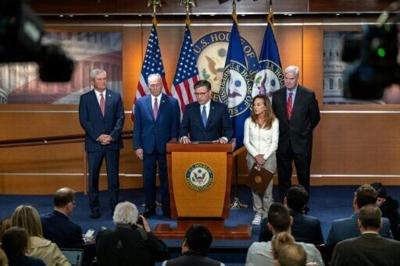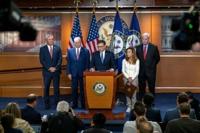The US government shutdown entered its fourth week Wednesday, becoming the second longest in history, as Donald Trump's Republicans and the opposition Democrats faced increasing pressure to end a stalemate that has crippled public services.
Federal workers are set to miss their first full paychecks in the coming days, including tens of thousands of air traffic controllers and airport security agents -- an inflection point that helped end the last shutdown in 2019.
But with the current crisis entering Day 22, the bipartisan backbench groups in Congress who have struck deals behind the scenes to end past standoffs have hardly been talking, and there was no off-ramp in sight.
"This is now the second-longest government shutdown of any kind ever in the history of our country, and it's just shameful," Republican House Speaker Mike Johnson told reporters.
"Democrats keep making history, but they're doing it for all the wrong reasons."
The government has been gradually grinding to a halt since Congress failed to pass a bill to keep federal departments and agencies funded and functioning past September 30.
At the heart of the standoff is a Democratic demand for an extension of expiring health insurance subsidies that keeps premiums affordable for millions of Americans.
Republicans -- who run Congress and the White House but need Democratic votes to pass most legislation -- say that debate should happen later, not as part of a must-pass funding bill.
Democrats in the Senate have repeatedly blocked a House-passed short-term extension of funds, keeping 1.4 million federal workers on enforced unpaid leave, or working without pay.
- 'Nuclear option' -
Around 63,000 air traffic controllers and Transportation Security Administration agents are considered essential workers and expected to stay at their posts during government shutdowns.
Employees calling in sick rather than working without pay -- leading to significant delays -- was a major factor in Trump bringing an end to the 2019 shutdown, the longest in history at 35 days.
The Federal Aviation Administration issued a ground stop at two Houston airports on Tuesday due to staffing issues, according to a notice on its website, and the aviation industry has voiced fears over worsening absences as the shutdown drags on.
"For every day the government is shut down and employees in the aviation ecosystem are still furloughed, another layer of safety may be peeled away," Dave Spero, president of the Professional Aviation Safety Specialists union, said in a statement.
Confounding expectations at the start of the shutdown, Democrats have maintained a largely united front as they have repeatedly rejected Republican efforts to reopen the government.
"We're ready, we're willing, we're able to reopen the government to enact a bipartisan spending agreement that actually meets the needs of the American people," House Minority Leader Hakeem Jeffries said at a hearing on the impacts of the shutdown.
With no end in sight to the stalemate, Senate Republicans are under pressure to change the 60-vote threshold to advance legislation -- known as the "filibuster" -- so that they can approve the House-passed funding resolution without Democratic help.
They are hoping to avoid that so-called "nuclear option" and instead turn public opinion against Democrats this week with a measure to safeguard the pay of military personnel and essential federal workers.
The minority party is planning to block the measure, arguing that it cedes further power to Trump while failing to help 750,000 nonessential workers who have been placed on enforced leave without pay.
ft/des




